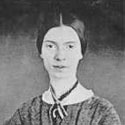Introduction
 Most scholars and critics include Emily Dickinson and Walt
Whitman among the very best poets in American history. Each of them
contributed so much to the evolution of modern poetry that their influence
continues to this day.
Most scholars and critics include Emily Dickinson and Walt
Whitman among the very best poets in American history. Each of them
contributed so much to the evolution of modern poetry that their influence
continues to this day.
Aside from their status as great poets, these two individuals bore little
resemblance to one another, as people or as poets. Whitman traveled
throughout America and developed free verse, in part, to help in his quest
to become the "American Poet" called for by Ralph Waldo Emerson. Dickinson,
on the other hand, rarely left her father's house in Amherst, MA, and
published only a few of her intense, minimalistic poems in her lifetime.
For this project students should read a selection of poems from each
author (links provided below) and write an essay discussing the obvious
but somewhat surprising differences in their perspectives on a relevant
literary theme.
Back to Top
The Task
 Readers tend to note one similarity between them--the strong individualism
and non-conformity most readers see reflected in their poetry and lifestyles.
While this individualism creates a basic similarity in perspective in some of
their poetry, one cannot help but notice a strong divergence in their view
and treatment of specific topics. One example involves their poems on death,
a common Romantic period theme.
Readers tend to note one similarity between them--the strong individualism
and non-conformity most readers see reflected in their poetry and lifestyles.
While this individualism creates a basic similarity in perspective in some of
their poetry, one cannot help but notice a strong divergence in their view
and treatment of specific topics. One example involves their poems on death,
a common Romantic period theme.
Readers may not prefer to think about what they regard as depressing
topics, but writers in all periods consider death an important theme. Of
course, some writers treat the theme obliquely or incidentally as part of
their consideration of some other topic, but Whitman and Dickinson wrote
frequently and fairly directly about death. Careful readers soon understand
each poet's message on death and then begin to see interesting and unexpected
differences between their treatment of this common theme.
Back to Top
The Process
Students should consult the resources section
below and read the material there. As students read the poems and
biographical material provided for them, they should try to think about
the ways these poets discuss death.
The best approach involves looking for specifics. Asking various specific
questions will assist in formulating a characterization of the poets'
perspectives on death. Consider the following examples with which to get started:
-What does each poet want us to know about death?
-How would they have us consider and view death?
-How persuasive are they in bringing us around to their view?
Having arrived at some answers, students should consider the poets' lives
and ask to what degree the poets' perspectives on death fit with the details
of their lives and personalities, as revealed through the biographical
material provided in class, the text, and the resources below.
Back to Top
Resources
--
Dickinson, Emily (from The Columbia Encyclopedia, Sixth Edition. 2001)
--Emily Dickinson
(from Wikipedia)
--Emily Dickinson's
The Complete Poems
--
Because I could not stop for Death
--
I heard a fly buzz when I died
--
I felt a funeral in my brain
--
Let down the bars, O Death
--
The bustle in a house
--
Whitman, Walt (from The Columbia Encyclopedia, Sixth Edition. 2001)
--Walt Whitman
(from Wikipedia)
--Leaves of Grass
--Leaves of Grass
--
The City Dead-House
--
Vigil Strange I Kept on the Field
--
To One Shortly to Die
--
The Dresser
--
Come up from the Fields, Father
Don't be surprised if you need to consult a dictionary
in order to understand these poems.
--
The American Heritage Dictionary of the English Language
--
Merriam-Webster Dictionary
Back to Top
Evaluation
This project should require some independent thought
from students. This is not designed as a research paper,
but as a personal exploration of a topic. Students should not
blindly relate the insights of scholars and critics; instead, they should
write about the poems they have read, look in the poems for key statements
and determine their implications, and take quotations from the poems that
illustrate the points they want to make.
Papers that reflect the most logical and original thinking will receive the
highest grades. Papers reflecting a lack of
revision and editing will
receive very low grades indeed!
Back to Top
Conclusion
 Writers explore themes and ideas that may not strike us as all that
pleasant; still, thinking about these themes often can prove useful and
valuable. That explains why writers write about these and why readers may
consider it worthwhile to read about them.
Writers explore themes and ideas that may not strike us as all that
pleasant; still, thinking about these themes often can prove useful and
valuable. That explains why writers write about these and why readers may
consider it worthwhile to read about them.
Back to Top
Designed by Michael Byers
Orange High School
Hillsborough, NC
Last updated June, 2008.
Based on a template from
The WebQuestPage
